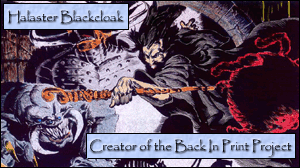Unther wrote:
There are all sorts of problems with this, specifically the idea that you can have more than one omniscient entity in the setting. For a very quick reason why, an omniscient entity would know how to keep a secret from another omniscient entity, which means one of them can NOT be omniscient!
Good point!

Yeah, that would make it impossible, now that you mention it.
I guess I'd make the gods in my campaigns omniscient to most things, specifically to mortal doings, but not privy to other gods' business (ie gods of the same stature).
Once the gods are not omniscient, they can make mistakes, and once they can make mistakes, a mortal who is sufficiently lucky or intelligent, may be able to outwit them. This does not mean that any given mortal has even an ice-creams chance in hell of actually outwitting a god, but it is possible.
Well, I could
maybe see
Halaster messing with a god's mind, but other than that...


That is a matter of taste, personally, I prefer my gods to be powerful but fallible, somewhat like the ancient pantheons.
Now that you brought all that up, it does make me think. It'd be really hard to have any sort of pantheon with the gods being truly omniscient. It would by default forgo any possibility of godly rivalry or secret dealings and power grabs, etc.



